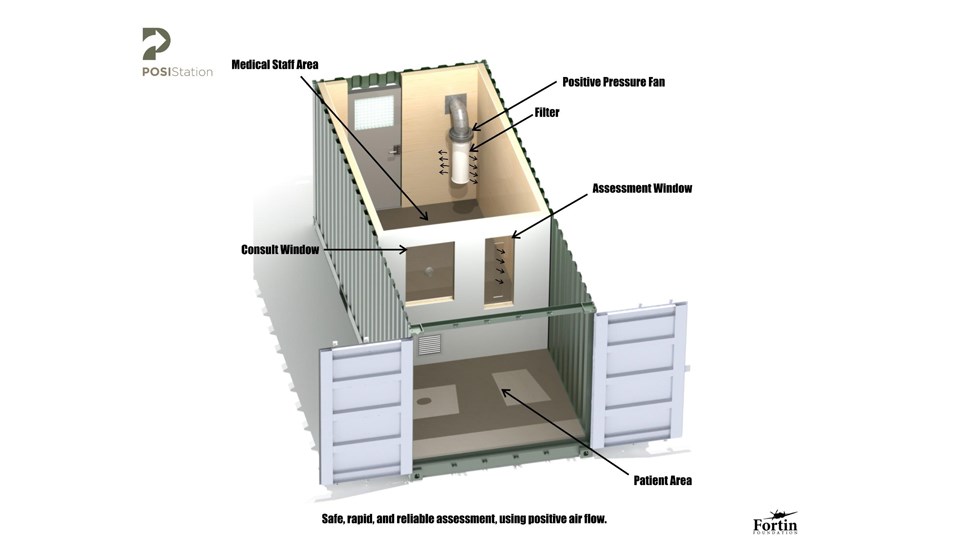So a doctor and an entrepreneur walk into a shipping container – no, it’s not the beginning of a joke, but the beginning of the building of a prototype medical assessment station that could change how doctors and patients interact in the days of COVID-19.
Born of discussions between Dr. Dennis Reich (the doctor) and Tom Fortin (the entrepreneur), the POSIStation is a mobile, self-contained assessment station that can be set up anywhere, and it was designed and built in Sudbury out of a six-metre (20-foot) shipping container.
The POSIStation addresses a number of current issues in the midst of this pandemic: the container is portable, so it can be dropped in a parking lot anywhere; it isolates doctors and patients on either side of a wall, protecting both, while still enabling interactions; and it uses positive air pressure to make the collection of swabs safe for all involved.
As a mobile testing and assessment centre, the POSIStation can help hospitals increase capacity both for assessing patients for COVID-19 and testing people for the SAR-CoV-2 virus that causes it. And because the design is portable, they can be set up anywhere.
What’s more, they’re relatively inexpensive to build, Fortin told Sudbury.com.
Patients enter on one side, while medical personnel enter on the opposite side, separated by a wall with a window.
“It is a regular ‘seatainer’ that is essentially brand-new. At the back of the unit there is a heated and sealed 8'x12' enclosure where medical staff can reside. Once they enter, close, and lock the door, it is under positive pressure,” Fortin said.
“Air is pulled from the outside and filtered with positive pressure relative to outside. The (other) eight feet of the container is where patients would come in.”
When it comes to keeping medical staff and patients safe, the air is the thing.
“It’s all about airflow. Air is your friend in this,” Fortin said.
“There is a wall with a consult window, so [a patient] can talk with a doctor or nurse, can answer questions and give their personal information, and then there is an assessment window. The doctor controls the flow of air so they can actually do the swabs.
“The air flows from the medical side to the patient side so there is no chance of aerosol getting back into the medical side.”
Fortin said the unit is built using standards provided by the U.S. Centers for Disease Control and the American Society of Heating, Refrigerating and Air-Conditioning Engineers which, he added, “has rigorous design standards and guidance for infection control.”
Unlike hospitals with rooms inside a larger building, a POSIStation unit can be dropped in a parking lot. It doesn’t even have to be adjacent to a medical facility.
“We have a testing capability that can be set up anywhere,” Fortin said in a phone interview.
The public space will face south. The vestibule can be disinfected as needed. It took about eight days to build the prototype, which is “100 per cent Canadian-made with Canadian components.”
“There is still a lot of testing to do to finalize the engineering challenges. There will be airflow monitors and alarms to alert staff,” Fortin said.
“Any possible sources of contamination are being considered and examined. Protocols for marshalling and identifying the people will be established; perhaps this could be drive-up. Sit in your car and be informed even by text. Exit the vehicle and you’re no more than one person at a time in the patient side of the unit.”
Keeping medical staff safe from infection was top of mind when conceiving of the POSIStation, particularly the situation in Italy.
“The second person to get sick in most small towns (in Italy) was the doctor,” Fortin said. “Hospitals are not set up to deal with people with such a contagious disease. We can’t have people going into a building.
“(The POSIStation is) a tool that must be used with proper procedures and protocols.”
With one built, the designers have a good handle on costs and timelines, and Fortin said production could be ramped up fairly quickly at a cost comparable to a new vehicle: about $30,000 a unit.
Fortin estimates 100 or more could be constructed right here in Sudbury at a rate of one completed unit every five days.
“This is going to be done right and it is going to be done quickly.”
Modifications include temperature-taking technology, as well as a made-in-the-North solution for faster COVID-19 testing.
Fortin characterized the project as a community effort involving input and work from JP Krucker Engineering and Ionic Engineering.
It might be designed and built in the North, but its usefulness is universal, Fortin said, and POSIStation may also have application at airports, border crossings, worksites, mining sites, and educational and health institutions.
Visit POSIStation.com for more information.




